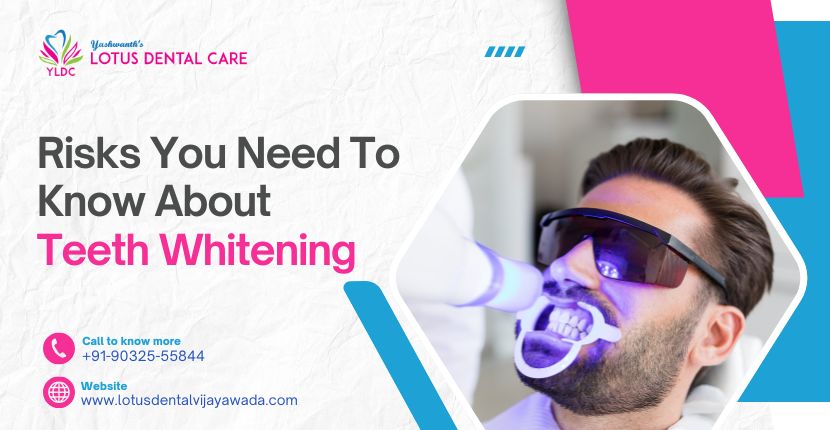10:00 AM to 8:30 PM (Mon - Sat)
10:00 AM to 2:00 PM (Sunday)
Risks You Need to Know About Teeth Whitening

Risks You Need to Know About Teeth Whitening
Teeth whitening is one of the most popular cosmetic dental procedures for brightening your smile. It’s effective, fast, and can significantly boost your confidence. However, like any dental treatment, teeth whitening has potential risks you should know before deciding to undergo the procedure. By understanding these risks, you can make an informed choice and take the necessary steps to minimize adverse effects.
Tooth Sensitivity
One of the most common side effects of teeth whitening is increased tooth sensitivity. During the whitening process, the active agents penetrate the enamel to remove stains. This can irritate the tooth’s inner layers, leading to temporary sensitivity to hot, cold, or sweet foods and beverages. While the sensitivity usually subsides within a few days after treatment, consulting with your dentist about desensitizing agents or fluoride treatments can help manage this discomfort.
Gum Irritation
Professional teeth whitening involves using high-concentration bleaching agents, which can sometimes irritate the soft tissues in your mouth, especially if the gel comes into contact with your gums. Gum irritation typically results in redness or mild inflammation but is generally short-lived. Dentists take precautions to minimize this risk, such as applying a protective barrier over your gums. If you experience significant discomfort, notify your dentist immediately.
Uneven Whitening
If you have dental restorations such as crowns, veneers, or fillings, it’s important to note that these materials do not respond to whitening agents like natural teeth. This can lead to uneven coloring between your natural teeth and restorations. To address this, your dentist may recommend additional cosmetic treatments, such as replacing old restorations to match your new tooth shade.
Overuse of Whitening Treatments
While professional teeth whitening provides stunning results, repeated treatments can weaken your enamel. Enamel erosion increases the risk of cavities and may lead to long-term sensitivity. To avoid this, follow your dentist's recommendations on the frequency of whitening treatments and maintain your results with good oral hygiene practices rather than over-whitening.
Allergic Reactions to Whitening Agents
In rare cases, some individuals may experience an allergic reaction to the ingredients used in professional whitening products. Symptoms might include irritation or swelling of the mouth tissues. If you suspect an allergy, inform your dentist before treatment. They can conduct a patch test or suggest alternative whitening solutions.
Temporary Results
Professional teeth whitening is not a permanent solution. Your teeth may gradually discolor again, both naturally and due to lifestyle choices. While this isn’t necessarily a risk, it’s important to have realistic expectations and commit to maintaining your results with proper care and periodic touch-ups, as your dentist recommends.
Teeth whitening is a safe and effective way to brighten your smile when performed under the guidance of a professional dentist. However, understanding the potential risks can help you prepare for the process and ensure the best results. Always consult your dentist to discuss your oral health, the expected outcome, and any concerns you may have. You can enjoy a radiant, confident smile with minimal risks with the right care and precautions.


